Table of contents
Abstract
When the Kingdom of Bahrain ratified the Vienna Convention for the protection of the Ozone Layer and the Montreal Protocol on Substances that Deplete the Ozone Layer in the early 1990s as well as the adopting the HCFCs Phase-Out Management Plan (HPMP) in 2015, several advanced steps were taken to achieve the intended requirements successfully. Bahrain worked on the legal aspect by updating its national legislations and creating a comprehensive bylaw that included 4 main goals: registration of refrigerants, refrigeration and air-conditioning (RAC) units, release of refrigerants in the atmosphere prevention, refrigerants containers management and technicians and operators working in the refrigeration and air-conditioning sectors training and licensing. While on the practical aspect, Bahrain has established a National Refrigerant Reclamation Center that reclaims and refills refrigerants, developed a local certification scheme for technicians working in this sector, organize inspection campaigns on service companies to enhance the control and monitoring on refrigerant registration and movement. Such activities will ensure that only licensed companies can trade and use refrigerants, large RAC systems are well maintained and monitored, adoption of recovery, reclamation and reusage (RRR) practices by training and licensing technicians and mitigation of the global rise in refrigerant prices.
The Background
The Kingdom of Bahrain -being an Article5 – was the first country in the Gulf region to ratify the Vienna Convention and the Montreal Protocol in early 90s. Since then, has been implementing projects and activities to reduce the consumption of the Ozone depleting substances (ODS) successfully and in conjunction with strategic national plans. The Montreal Protocol program in Bahrain, being supported by the Multilateral Fund (MLF) of the Montreal Protocol, is led by the Supreme Council for Environment of Bahrain (SCE) in cooperation with the UN Environment Programme (UNEP) and UN Industrial Development Organization (UNIDO) as lead and cooperating implementing agencies.
With the Kigali amendment, the consumption of the HFCs had to be controlled and reduced since it was found that such technologies have high Global Warming Potential (GWP) despite having zero Ozone Depleting Potential (ODP). This was a real struggle to the Kingdom of Bahrain as the alternative technologies since HFCs are widely relied as an alternative for HCFCs and their consumption is rapidly growing along with the national economic and population growth.
Since Bahrain depends on imported refrigerants, spare parts and technologies for its manufacturing and service sectors, the consumption of HCFCs successfully reduced by 40% in 2020 as part of the HCFC phase-out management plan (HPMP), supported by MLF, However, with the introduction and enforcement of the Minimum Energy Performance Standard (MEPS), technologies using HFCs were rapidly phasing-in the country replacing those using HCFCs.
Regrettably, it was found that many technicians that install and maintain RAC units have been adopting inappropriate and non-environmentally practices when handling refrigerants during servicing such as venting refrigerants into the atmosphere, failing to detect or properly fix leakages, including for large RAC systems, and avoid recovery and recycling practices. This of course leading to unneccssary additional consumption of tons of refrigerants the country needs to import not mentioning compliance consequences.
The Regulatory Solution
The Bahrain’s HCFCs Phase-Out Management Plan (HPMP) contains several activities and initiatives to accomplish phasing-out HCFCs in the intended timelines. One of these activities is updating national regulations to better control and monitor Ozone depleting substances. Thinking outside the box, Bahrain decided to broaden the scope of control and create a comprehensive bylaw and a model to better achieve the Montreal Protocol requirements and accomplishing multiple goals in one big inclusive project. The goals of the regulation were to address 4 key elements, as in below figure, in addition to the existing licensing/quota system of the controlled substances.
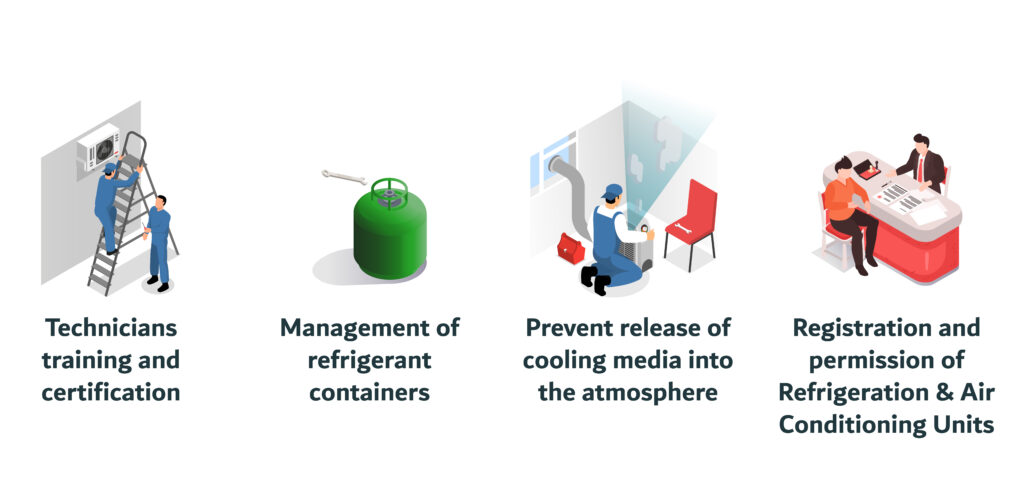
The preparations and work on the bylaw started in 2017 inspired by comprehensiveness of the F-Gas regulation of Europe and use the model to build a national one that can operational and feasible for local conditions. A thorough consultation process was followed, over a period of 3 years, and includes several levels of governmental, public, and private sectors consultation. As a result, the Ministerial Decree No. 1/2020 with respect to Management of Refrigerants, Refrigeration and air-Conditioning units was issued.
The Decree regulates the process of managing refrigerants, refrigeration and air-conditioning units which included registering refrigerants, refrigeration and air-conditioning units, preventing the release of refrigerants in the atmosphere, managing refrigerants containers and training and licensing technicians and license companies and operators working in the refrigeration and air-conditioning sectors. When the bylaw came into effect in 2020, NOU made sure there was proper media coverage whether in newspapers, television, social media as part of spreading the awareness to companies and public. Below figure present the scope of coverage of the local regulation.
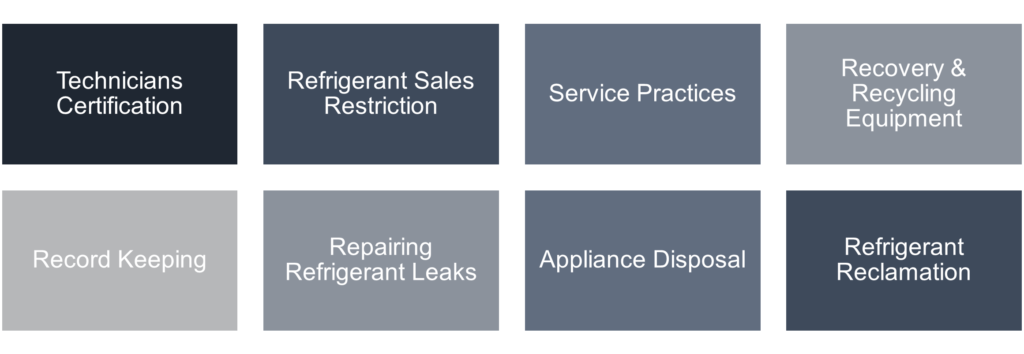
How Does it Work?
The first aspect was implemented utilizing the E-licensing system and in cooperation with the customs officers such that no RAC equipment is imported without obtaining the necessary environmental approval where technical specifications are sent to the NOU for approval. The importers must also provide manufacturer company name and country of importation. On the other hand, the customs officers were continuously trained on the updated regulations for the vital role they play in enhancing the control on controlled substances and equipment. In addition, refrigerant importers are obligated to submit quarterly reports detailing the previous year quantities, current year consumption and remaining quantities in store including number of disposable cylinders remaining. On top of that, multiple inspection campaigns were conducted on the services companies to ensure that they are licensed to buy refrigerants from local market as well as obtain the minimum tools and equipment required for maintaining RAC units which enhanced our control over the refrigerants’ movement. A total of 1282 companies were visited in a span of nearly 4-5 months where those who were found lacking were issued a warning violation with deadline to register and obtain the necessary licenses.
The second aspect was implemented by creating a registration form for RAC units for the purpose of creating a database of all large units installed and maintained in Bahrain. From there, all locations have been included in this year’s inspection campaign to ensure full compliance with the bylaws requirements such as fitting leak detection systems to prevent refrigerant leakage.
The third aspect on refillable cylinders was achieved by adopting new specifications for such cylinders and specifying deadlines to stop importing refrigerants in disposable cylinders. The reason for this ban was because there was no proper facility to dispose of such waste. While conducting a study back in 2016-2017, it was found that Bahrain has nearly 200 Tons/year of wasted refrigerants due to non-refillable containers and big portion of that quantity is from Bahrain’s HCFC Quota that needs to be preserved now more than ever especially with the reduced consumption obligation. Therefore, the ban timeline was decided to be gradual to first include banning the non-refillable cylinders for HCFCs in 2021 while the other refrigerant cylinders in 2022.
When the bylaw was being prepared and finalized between 2017-2020, all of the refrigerant importers were invited to the annual Environmental Forum for the protection of Ozone Layer in Bahrain held in celebration of the National Ozone Day as part of the awareness campaigns for all stakeholders to inform them of this ban timeline, explain the reason behind this ban and the bigger picture so that they can take measures from that time to study the market, look for suppliers and revise the sales plan. Simultaneously, the National Ozone Unit (NOU) in cooperation UN Environment Programme (UNEP) and the UN Industrial Development Organization (UNIDO) established a National Refrigerant Reclamation Facility operated by Aztec Services through a bidding process.
The purpose of this center is to create a refrigerant network, collect the used refrigerants in market to reclaim them for reusing thus preserving the refrigerants stock in Bahrain, create new job opportunities for specialists as well as assist in improving the practices adopted during maintenance. The center has also expanded its line of business and got accredited as a refrigerant refilling center in the year 2020 which will help the market greatly once the non-refillable cylinders are banned. When the bylaw was implemented in 2020, all of the HCFC importers were gathered in September of the same year to firmly present a well-studied plan to import their quota in 2021 when the HCFC disposable cylinders was going to be banned, and indicate how will they import their quota; in refillable cylinders or tonners, will it be filled or empty, will they refill it locally or send it back to the supplier as well as an approximate timeframe of when will they be importing their quota in the year.
As of today, Bahrain has about 4 refrigerant refilling centers and NOU is working on establishing a laboratory specialized for refrigerant analysis, as well as continue training and licensing technicians working in the RAC sector. The inspection campaigns will ensure that refrigerant trade is controlled and managed by licensed companies only while the reclamation and using refillable cylinders will ensure adoption of RRR practices as well mitigate the global rise in refrigerant prices, production shortage and complying with phase-out timelines.
As for the fourth aspect, the first thing that needed to be accomplished was a training curriculum therefore, NOU in cooperation with UNEP, the Italian Association of Technicians (ATF) and Centro Studio Galileo as well as other international experts; developed a local certification scheme for technicians benefiting from the European F-Gas Certificate but modified it to suits local market and operating conditions in Bahrain without compromising minimum required competencies and skills. A program to build a pool of local certified trainers was the beginning along with identifying local training center under the Ministry of Education and equip it with the necessary support aids, tools and stations to deliver the training program. Once that completed successfully, the registration was opened for a small batch of technicians from selected service companies. This was important step to test the quality of the training and certification with the built-in capacities. Sample of the mandatory license for field technical and engineers is show below.
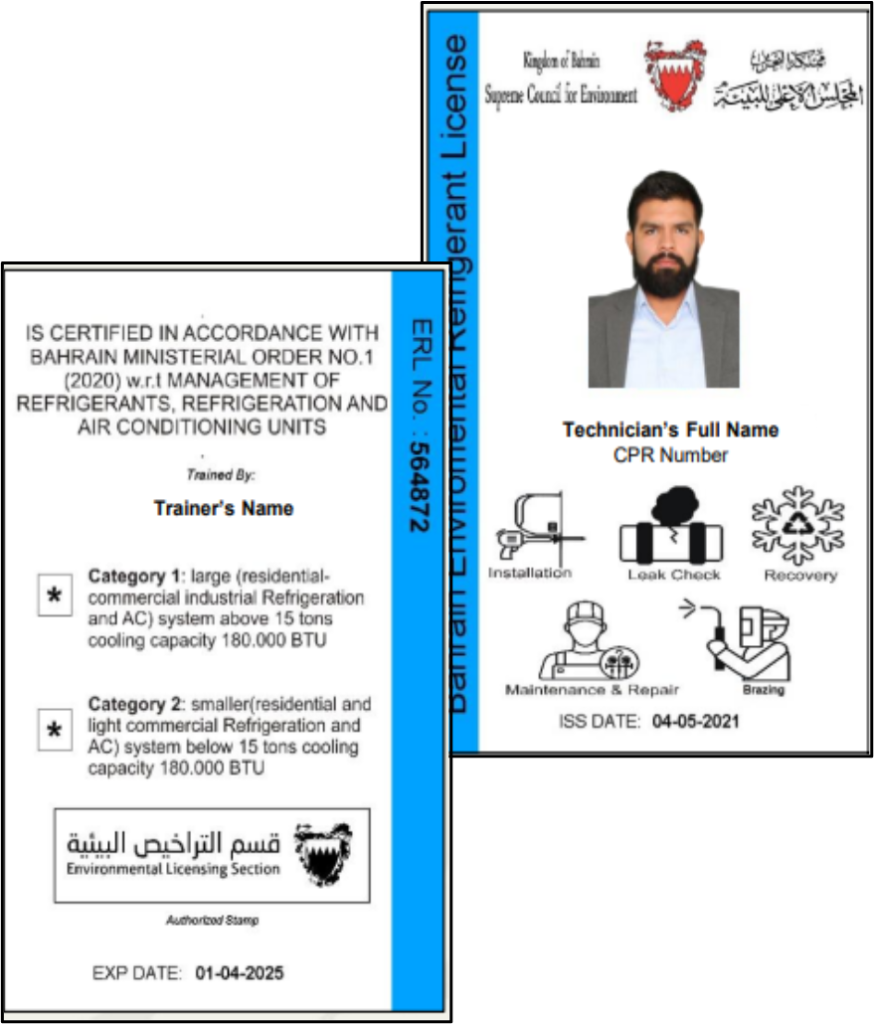
In addition to that, NOU cooperated with Tamkeen, which is a semi-autonomous government agency, to support Bahraini technicians, engineers and specialists working in the RAC field by sponsoring their training and certification as a step to encourage all governmental authorities and private sector to train and license their Bahraini technicians.
The training program also extended to included graduates and undergraduates studying in this field, so they are properly qualified and skilled.
The comprehensive licensing scheme for the RAC sector is the backbone of this regulation where through rigorous implementation it ensures compliance of all stakeholders, hence secure smooth compliance, and control of RAC servicing sector. Below figure shows the key licensing elements of the regulation.
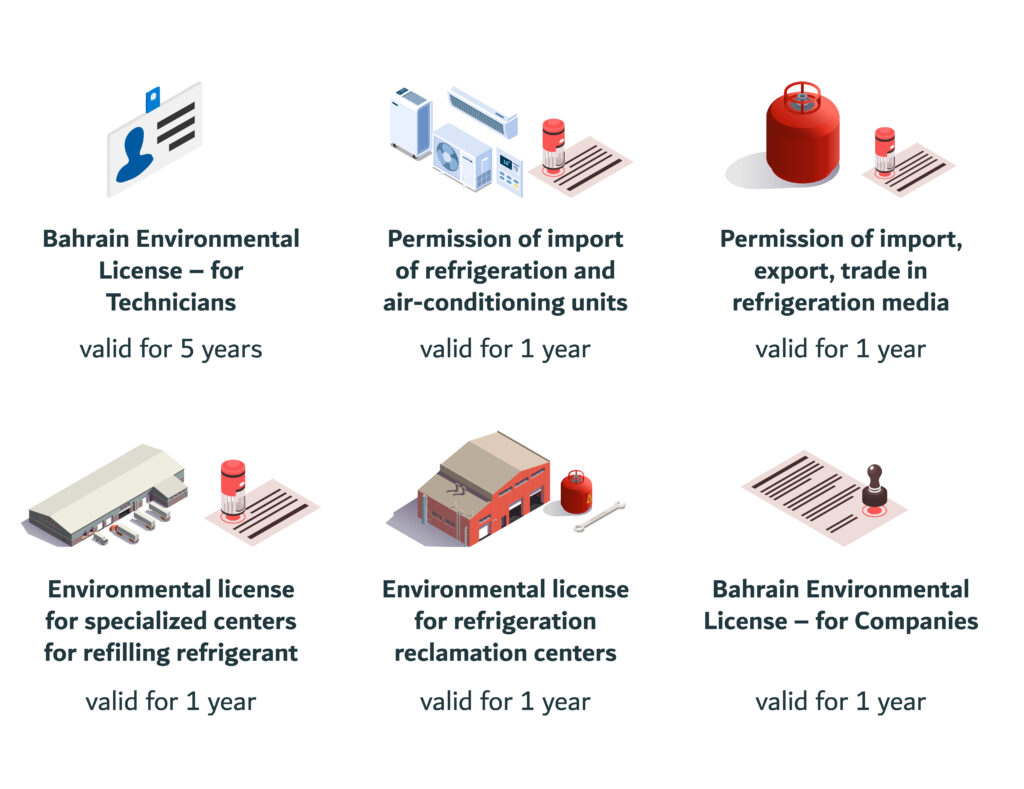
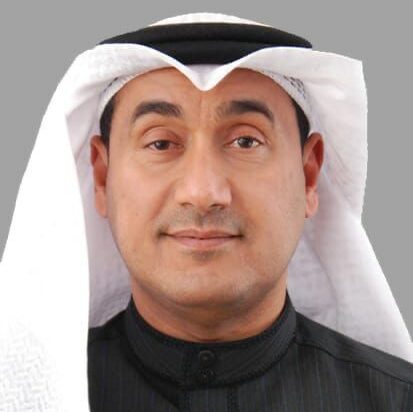
Hassan Mubarak
